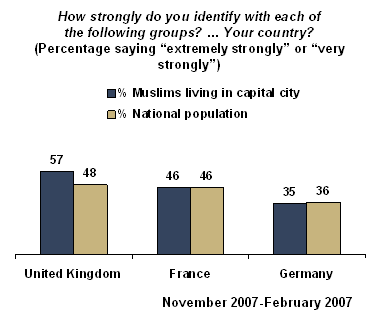
Surveys in London, Paris, and Berlin indicate resident Muslims at least as likely as general public to identify with country
by Zsolt Nyiri, Ph.D.
Regional Research Director for Europe, Gallup World Poll
GALLUP NEWS SERVICE
PRINCETON, NJ -- There are two extreme viewpoints on the issue of Muslim integration into Europe. On the one hand, Muslims are accused of resisting peaceful integration into European society, as evidenced by events such as the bombing in London and the riots in France in 2005. On the other hand, Europeans are accused of being increasingly hostile toward Muslims and other immigrants, as evidenced by the popularity of European anti-immigration parties or the growing number of legislative attempts to limit the use of religious symbols, including the veil worn by Muslim women.
Poll results provide very limited support for either of these extreme positions. Rather, our data reveal that, while religion remains an important part of their identity, Muslim residents of London, Paris, and Berlin also identify strongly with the country in which they live. In all three cities, strong majorities of Muslims -- 68% in Paris, 85% in Berlin, and 88% in London -- say religion is an important part of their lives. These figures stand in stark contrast to those found among the general population: only 23% of French, 36% of British, and 41% of German respondents overall consider religion to be an important part of their lives.
However, the idea that their higher religiosity implies a weaker sense of national identity is simply false. In London and Paris, when Muslims were not forced to choose between religious and national identity, they tended to associate themselves with both. In fact, in none of the three countries were Muslim residents significantly less likely than the populations at large to say they identify strongly with their country. (In the United Kingdom, they were actually somewhat more likely to do so).
Gallup.com
Saya juga baca artikel kakak mengenai :
ReplyDeleteobat herbal hernia
jual obat pemutih gigi
obat asam urat herbal
cara cepat menurunkan berat badan setelah melahirkan
obat ambeien mujarab
tips menyembuhkan ambeien dari ustad danu
menyembuhkan ambeien secara alami
masalah seksual yang sering dialami pria
cara membesarkan mr p
obat herbal kosmetik
obat pelangsing badan
jual obat vimax original
game pc murah